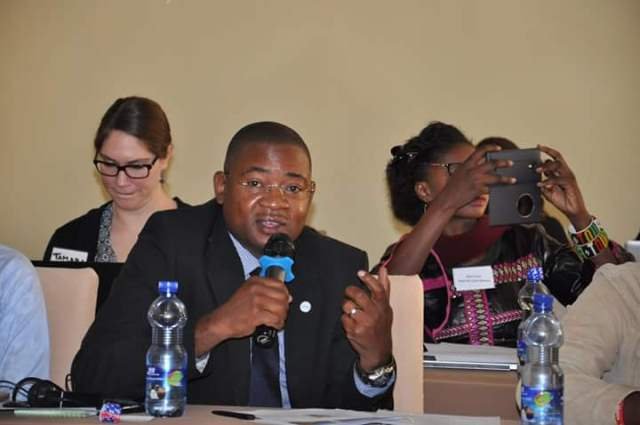 Sam Ntelamo, Resident Representative of IPPF Liaison office to the AU and UNECA in Ethiopia’s Addis Ababa says increased political commitment is a window of opportunity for young people.
Sam Ntelamo, Resident Representative of IPPF Liaison office to the AU and UNECA in Ethiopia’s Addis Ababa says increased political commitment is a window of opportunity for young people.
As part of events holding on the margins of the 28th African Union Heads of state and government summit in Addis Ababa-Ethiopia, a Partner’s strategy meeting was held this Friday 27th January 2017. AU’s partners focused discussions on the theme of the year being:« Harnessing the demographic dividend through investment in youth».
In his presentation entitled : « Youth and Health », Sam Ntelamo, Resident Representative of the International Planned Parenthood Federation (IPPF) Liaison office to the AU and the United Nations’ Economic Commission for Africa (UNECA), underscored some windows of opportunity for young people. He says increased political commitment, progressive policies of our government, Sustainable Development Goals(SDGs), Agenda 2063, AU’s 2017 theme,increased interest in Comprehensive Sexuality Education(CSE), moving away from risk reduction programmes to the promotion of wellbeing should be prioritized. He mentioned the fact that : « preventing early pregnancy and poor reproductive health outcomes among adolescents and youths in Africa is essential to harnessing the demographic dividend ». Sam Ntelamo while explaining the unmet needs of young people which could be met through harnessing the demographic dividend, stated out facts. He says: « girls face unique health problems such as pregnancy, Female Genital Mutilation and carry a disproportionate share of extreme health risks; that is child marriage, sexual coercion and HIV.Coerced sex is reported by 10 % of girls who had their first sex before the age of 15 ». He equally outlined the fact that, worldwide, adolescents girls have more than 14 million births each year, and more than 90% of these occur in developing countries. Pregnancy and childbirth are still one leading causes of death among women aged 15 to 19. According to him, harnessing the demographic dividend in the context of Sexual Reproductive Health and Rights (SRHR) is a step by step process which needs to kick-off with improved access to SRHR services followed by a youth focused perspective without discrimination, empowerment and solidarity, and to end with a probability of harnessing the demographic dividend. Moving the demographic dividend for young people entails setting the pace for advocacy by cultivating champions and youth leaders across sectors and all levels, prioritizing CSE, putting in place innovative approaches for young people and implement policies to support the AU’s roadmap.
Talking of AU’s demographic dividend road map, Kokou Sename Djagadou in his presentation brought out the major highlights. He started by edifying the assistance on the notion of demographic dividend as; the benefit that can arise when a country has a relatively large proportion of working-age population due to declining fertility, and effectively invests in their health, empowerment, education and employment through public action and private sector involvement. The AU’s project officer in the department of human resource, science and technology explained briefly the AU roadmap, that is, it bears in mind the urgent necessity to transform the potential of Africa’s large youth population, often referred to as the youth bulge, into a demographic dividend and to help usher African countries towards the ambitious yet critical aspirations and goals of the complementary Agenda 2063 and the 2030 Agenda for Sustainable Development. Worthy of note, the AU roadmap relies on four pillars which are: Employment and entrepreneurship, Education and skills development, Health and wellbeing, and Rights, Governance and Youth empowerment.
Apart from the UNFPA, UNESCO, Save the children, the AU and IPPF, the Partners’ strategy meeting of Addis Ababa gathered other international organisations such as ONE, an organisation which daily works for the wellbeing of populations in the continent. ONE is a campaigning and advocacy organisation of more than seven million people around the world taking action to end extreme poverty and preventable disease, particularly in Africa. ONE believes the fight against poverty.
By Elise Kenimbeni (Addis Ababa)



